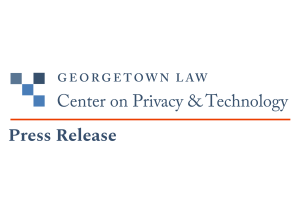Our Work
Founded in 2014, the Center on Privacy & Technology is a leader at the intersection of privacy, surveillance, and civil rights.
Latest Work

The Privacy Center Co-Hosts Annual Privacy Law Scholars Conference
The Institute for Technology Law & Policy and the Center on Privacy & Technology co-hosted the annual Privacy Law Scholars Conference (PLSC) at Georgetown Law on May 30 and 31, 2024. PLSC is the premier academic conference of privacy, law, and technology scholars, researchers, and practitioners in the world.

“Raiding the Genome” report covered in The Latin Times
The Latin Times covered the findings and release of our latest report "Raiding the Genome: How the United States Government Is Abusing Its Immigration Powers to Amass DNA for Future Policing." The article quoted directly from the report.

Telemundo Covers “Raiding the Genome”
Telemundo covered our latest report findings from "Raiding the Genome: How the United States Government Is Abusing Its Immigration Powers to Amass DNA for Future Policing" in a video piece and featured an interview (in Spanish) with report co-author and Director of Research & Advocacy Stevie Glaberson.

LA Times Covers “Raiding the Genome”
The LA Times covered our latest report findings from "Raiding the Genome: How the United States Government Is Abusing Its Immigration Powers to Amass DNA for Future Policing." In a front page article. Director of Research & Advocacy Stevie Glaberson was quoted "Even when people know what’s happening, they’re terrified to ask questions, they’re terrified to object, they’re terrified to refuse."

“Raiding the Genome” report in Newsweek
Newsweek covered our latest report findings from "Raiding the Genome: How the United States Government Is Abusing Its Immigration Powers to Amass DNA for Future Policing." The article featured an interview with Emerald Tse: "In addition to the massive increase [since 2020], the fact that it's happening through coercive tactics; that the program is illegal and disproportionate; and has a disproportionate impact on people of color [makes it wrong]," Tse said.

“Raiding the Genome” report covered in The Record
The Record covered our latest report findings from "Raiding the Genome: How the United States Government Is Abusing Its Immigration Powers to Amass DNA for Future Policing." The article featured an interview with Associate Emerald Tse: “Many of the people that we interviewed did not see written notices and they were not verbally told that their DNA was taken either,” Tse said.

New Privacy Center Report Finds Department of Homeland Security’s DNA Collection Skyrocketed 5000% in Under 4 Years
The Privacy Center published "Raiding the Genome: How the United States Government Is Abusing Its Immigration Powers to Amass DNA for Future Policing." Authored by Director of Research & Advocacy Stevie Glaberson, Associate Emerald Tse, and Executive Director Emily Tucker, the report describes and analyzes the expansion of a U.S. Department of Homeland Security program to collect DNA from nearly every person its agents detains. Read the full press release.

“Shadow Report to the US AI Policy Roadmap”
The Center signed on to coalition report, along with 39 others, that aimed to combat the inaccurate way in which the Senate positioned their roadmap as a starting point for understanding AI concerns. The "Shadow Report to the US AI Policy Roadmap" points out that this process has eaten up a year of this legislative session to produce yet another roadmap that superficially namechecks issues, instead of actual progress towards enforceable law.

Director of Research & Advocacy Stevie Glaberson’s Paper Published
Director of Research & Advocacy Stevie Glaberson's academic paper, "The Epistemic Injustice of Algorithmic Family Policing", was published in the UC Irvine Law Review. The piece explores the ways that family policing’s turn to “big data” risk-prediction algorithms scales up and expands the system’s already pervasive epistemic injustice.
“The Secret Life of Data” Book Talk
The Center co-sponsored (with Georgetown Tech Law, hosted by Digital Ethics Georgetown) a book talk moderated by Professor Laura DeNardis about The Secret Life of Data by Jesse Gilbert and Aram Sinnreich. The authors and Professor DeNardis discussed data surveillance, digital forensics, and generative AI. The book explores the unpredictable ways in which data surveillance, AI, and the constant presence of algorithms impact our culture and society in the age of global networks. No matter what form and what purpose we think it's being used for, data will always have a secret life. The book was published in May 2024.
